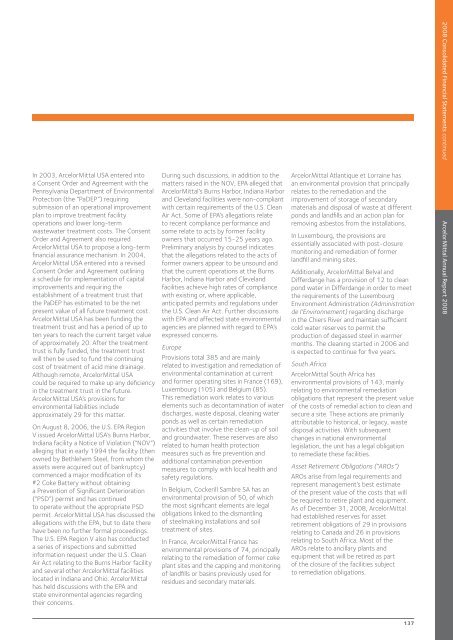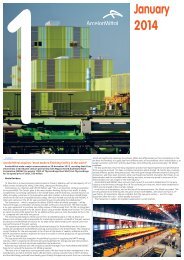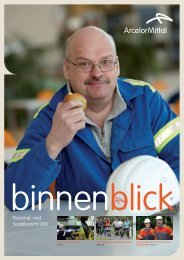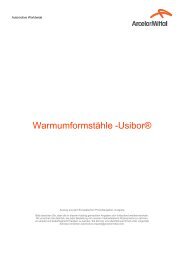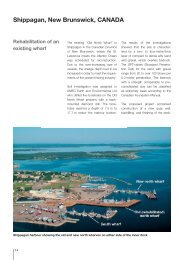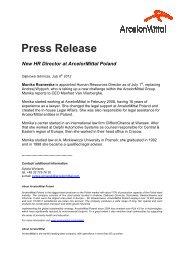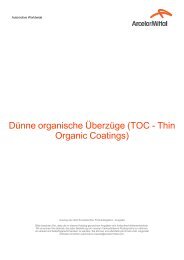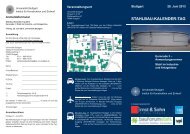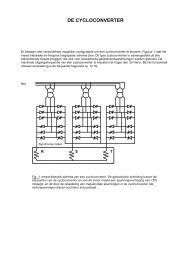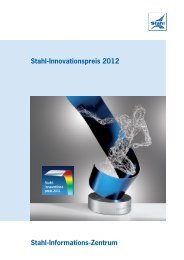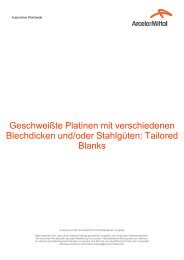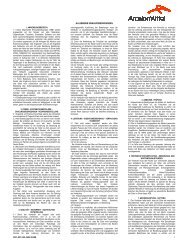ArcelorMittal Annual Report 2008
ArcelorMittal Annual Report 2008
ArcelorMittal Annual Report 2008
You also want an ePaper? Increase the reach of your titles
YUMPU automatically turns print PDFs into web optimized ePapers that Google loves.
In 2003, <strong>ArcelorMittal</strong> USA entered into<br />
a Consent Order and Agreement with the<br />
Pennsylvania Department of Environmental<br />
Protection (the “PaDEP”) requiring<br />
submission of an operational improvement<br />
plan to improve treatment facility<br />
operations and lower long-term<br />
wastewater treatment costs. The Consent<br />
Order and Agreement also required<br />
<strong>ArcelorMittal</strong> USA to propose a long-term<br />
financial assurance mechanism. In 2004,<br />
<strong>ArcelorMittal</strong> USA entered into a revised<br />
Consent Order and Agreement outlining<br />
a schedule for implementation of capital<br />
improvements and requiring the<br />
establishment of a treatment trust that<br />
the PaDEP has estimated to be the net<br />
present value of all future treatment cost.<br />
<strong>ArcelorMittal</strong> USA has been funding the<br />
treatment trust and has a period of up to<br />
ten years to reach the current target value<br />
of approximately 20. After the treatment<br />
trust is fully funded, the treatment trust<br />
will then be used to fund the continuing<br />
cost of treatment of acid mine drainage.<br />
Although remote, <strong>ArcelorMittal</strong> USA<br />
could be required to make up any deficiency<br />
in the treatment trust in the future.<br />
<strong>ArcelorMittal</strong> USA’s provisions for<br />
environmental liabilities include<br />
approximately 29 for this matter.<br />
On August 8, 2006, the U.S. EPA Region<br />
V issued <strong>ArcelorMittal</strong> USA’s Burns Harbor,<br />
Indiana facility a Notice of Violation (“NOV”)<br />
alleging that in early 1994 the facility (then<br />
owned by Bethlehem Steel, from whom the<br />
assets were acquired out of bankruptcy)<br />
commenced a major modification of its<br />
#2 Coke Battery without obtaining<br />
a Prevention of Significant Deterioration<br />
(“PSD”) permit and has continued<br />
to operate without the appropriate PSD<br />
permit. <strong>ArcelorMittal</strong> USA has discussed the<br />
allegations with the EPA, but to date there<br />
have been no further formal proceedings.<br />
The U.S. EPA Region V also has conducted<br />
a series of inspections and submitted<br />
information request under the U.S. Clean<br />
Air Act relating to the Burns Harbor facility<br />
and several other <strong>ArcelorMittal</strong> facilities<br />
located in Indiana and Ohio. <strong>ArcelorMittal</strong><br />
has held discussions with the EPA and<br />
state environmental agencies regarding<br />
their concerns.<br />
During such discussions, in addition to the<br />
matters raised in the NOV, EPA alleged that<br />
<strong>ArcelorMittal</strong>’s Burns Harbor, Indiana Harbor<br />
and Cleveland facilities were non-compliant<br />
with certain requirements of the U.S. Clean<br />
Air Act. Some of EPA’s allegations relate<br />
to recent compliance performance and<br />
some relate to acts by former facility<br />
owners that occurred 15-25 years ago.<br />
Preliminary analysis by counsel indicates<br />
that the allegations related to the acts of<br />
former owners appear to be unsound and<br />
that the current operations at the Burns<br />
Harbor, Indiana Harbor and Cleveland<br />
facilities achieve high rates of compliance<br />
with existing or, where applicable,<br />
anticipated permits and regulations under<br />
the U.S. Clean Air Act. Further discussions<br />
with EPA and affected state environmental<br />
agencies are planned with regard to EPA’s<br />
expressed concerns.<br />
Europe<br />
Provisions total 385 and are mainly<br />
related to investigation and remediation of<br />
environmental contamination at current<br />
and former operating sites in France (169),<br />
Luxembourg (105) and Belgium (85).<br />
This remediation work relates to various<br />
elements such as decontamination of water<br />
discharges, waste disposal, cleaning water<br />
ponds as well as certain remediation<br />
activities that involve the clean-up of soil<br />
and groundwater. These reserves are also<br />
related to human health protection<br />
measures such as fire prevention and<br />
additional contamination prevention<br />
measures to comply with local health and<br />
safety regulations.<br />
In Belgium, Cockerill Sambre SA has an<br />
environmental provision of 50, of which<br />
the most significant elements are legal<br />
obligations linked to the dismantling<br />
of steelmaking installations and soil<br />
treatment of sites.<br />
In France, <strong>ArcelorMittal</strong> France has<br />
environmental provisions of 74, principally<br />
relating to the remediation of former coke<br />
plant sites and the capping and monitoring<br />
of landfills or basins previously used for<br />
residues and secondary materials.<br />
<strong>ArcelorMittal</strong> Atlantique et Lorraine has<br />
an environmental provision that principally<br />
relates to the remediation and the<br />
improvement of storage of secondary<br />
materials and disposal of waste at different<br />
ponds and landfills and an action plan for<br />
removing asbestos from the installations.<br />
In Luxembourg, the provisions are<br />
essentially associated with post-closure<br />
monitoring and remediation of former<br />
landfill and mining sites.<br />
Additionally, <strong>ArcelorMittal</strong> Belval and<br />
Differdange has a provision of 12 to clean<br />
pond water in Differdange in order to meet<br />
the requirements of the Luxembourg<br />
Environment Administration (Administration<br />
de l’Environnement) regarding discharge<br />
in the Chiers River and maintain sufficient<br />
cold water reserves to permit the<br />
production of degassed steel in warmer<br />
months. The cleaning started in 2006 and<br />
is expected to continue for five years.<br />
South Africa<br />
<strong>ArcelorMittal</strong> South Africa has<br />
environmental provisions of 143, mainly<br />
relating to environmental remediation<br />
obligations that represent the present value<br />
of the costs of remedial action to clean and<br />
secure a site. These actions are primarily<br />
attributable to historical, or legacy, waste<br />
disposal activities. With subsequent<br />
changes in national environmental<br />
legislation, the unit has a legal obligation<br />
to remediate these facilities.<br />
Asset Retirement Obligations (“AROs”)<br />
AROs arise from legal requirements and<br />
represent management’s best estimate<br />
of the present value of the costs that will<br />
be required to retire plant and equipment.<br />
As of December 31, <strong>2008</strong>, <strong>ArcelorMittal</strong><br />
had established reserves for asset<br />
retirement obligations of 29 in provisions<br />
relating to Canada and 26 in provisions<br />
relating to South Africa. Most of the<br />
AROs relate to ancillary plants and<br />
equipment that will be retired as part<br />
of the closure of the facilities subject<br />
to remediation obligations.<br />
137<br />
<strong>2008</strong> Consolidated Financial Statements continued<br />
<strong>ArcelorMittal</strong> <strong>Annual</strong> <strong>Report</strong> <strong>2008</strong>


